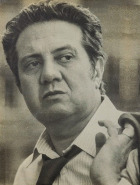

In this dissertation, Teófilo Braga is portrayed as one of the main drivers of Portugal's national renewal, promoting a republicanism rooted in the " Vintista and Patuleia traditions" . To achieve this renewal, Braga advocated for democracy through administrative decentralisation reforms, transforming municipalities into precursors of republics that would eventually culminate in a federal parliamentary system. From this focus on municipalism emerged Braga’s anti-clericalism, as he viewed the Holy Office, from a historical perspective, as an obstacle to local governance ( Soares, Teófilo Braga – Tentativa de Determinação do Seu Pensamento Político , 1950, pp. 41, 71).
The fight against the monarchy was seen as inseparable from the fight against social and economic injustice, requiring a national cause to achieve these goals: only with republican values, actions, policies, and reforms could Portugal " assert itself " . Soares noted Braga's somewhat detached stance on class struggle, arguing that Braga viewed the proletariat and the bourgeoisie as having the same origins and a shared destiny, envisioning social harmony and levelling through mutual coexistence in pursuit of national—thus unitary—objectives ( ibid. , p. 52).
However, also of particular interest is Mário Soares’s recognition, as a historian, of the inherent subjectivity that confronts a writer striving for objectivity and impartial critical analysis. In this type of work, Soares highlighted the unavoidable influence of personal criteria in compiling texts, admitting this approach to be “(...) always open to debate” ( ibid. , p. 10). At times, his own political convictions are discernible. For instance, regarding the First Republic, Soares observed that the regime’s leaders had demonstrated clarity and patriotism in their vision of national unity. As the son of a prominent republican figure and a committed adherent to the ideology, Soares’s political beliefs undoubtedly influenced his choice of topic. He openly acknowledged that his decision to study Teófilo Braga was motivated by Braga’s role as the “great ‘theorist’ of the republican movement,” on which Soares based part of his own political and social convictions (Avillez, Soares. Ditadura e Revolução [Soares: Dictatorship and Revolution], 1996, p. 106). Thus, certain themes in the dissertation were evidently shaped by personal motivations.
This work is financed by national funds through FCT - Foundation for Science and Technology, I.P, in the scope of the projects UIDB/04311/2020 and UIDP/04311/2020.
